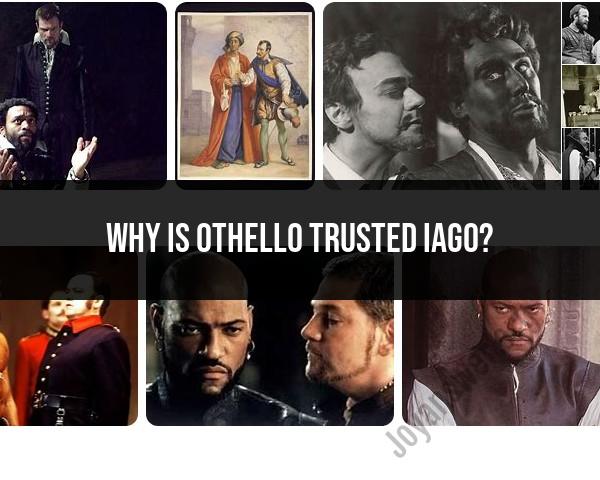Why is Othello trusted Iago?
Othello's trust in Iago is a critical element in the tragic unfolding of William Shakespeare's play "Othello." Several factors contribute to Othello's trust in Iago:
Iago's Honorable Reputation:
- At the beginning of the play, Iago is portrayed as a loyal and trustworthy ensign. Othello holds him in high regard and refers to him as "honest Iago." This initial positive perception sets the stage for Othello's trust in him.
Military Camaraderie:
- Othello and Iago share a military bond. They have fought together and developed a camaraderie based on their military experiences. Othello's trust in Iago is, in part, grounded in their shared history and the belief that fellow soldiers can be trusted implicitly.
Manipulation by Iago:
- Iago is a master manipulator. He skillfully exploits Othello's vulnerabilities, particularly his insecurities about his race and his marriage to Desdemona. Iago creates a web of deceit, playing on Othello's fears and suspicions to manipulate him into believing that Cassio and Desdemona are betraying him.
Othello's Lack of Self-Understanding:
- Othello, despite being a powerful and respected military leader, lacks self-understanding and is susceptible to self-doubt. Iago preys on Othello's insecurities and uses them as leverage to undermine his confidence and trust in those around him.
Othello's Naivety:
- Othello is somewhat naive in matters of personal relationships, especially when it comes to Desdemona. He doesn't fully comprehend the complexities of the political and social dynamics in the world around him. This naivety makes him susceptible to Iago's manipulation.
Iago's Professions of Loyalty:
- Iago consistently professes loyalty to Othello and claims to have his best interests at heart. He repeatedly declares his love for Othello while simultaneously plotting against him. These professions of loyalty contribute to Othello's misplaced trust in Iago.
Othello's Love for Desdemona:
- Othello's intense love for Desdemona is a double-edged sword. While it makes him vulnerable to jealousy, it also makes him susceptible to manipulation. Iago exploits Othello's love for Desdemona, convincing him that she could be unfaithful, and this further erodes Othello's ability to trust others.
In essence, Othello's trust in Iago is a tragic flaw that Iago skillfully exploits. The trust is built on a foundation of friendship, shared military experiences, and Iago's carefully constructed facade of loyalty. Othello's tragic downfall is a result of his inability to see through Iago's manipulation and his misplaced trust in a character who ultimately betrays him.
Betrayal and trust: Unraveling the question of why Othello trusts Iago
Othello trusts Iago for a number of reasons. First, Iago is his lieutenant, and Othello has come to rely on him as a trusted advisor and friend. Second, Iago is a skilled manipulator, and he is able to convince Othello that he is loyal and trustworthy. Third, Othello is vulnerable to Iago's deception because of his own insecurities and jealousies.
Manipulation and deception: Analyzing Iago's tactics to gain Othello's trust
Iago uses a variety of tactics to gain Othello's trust. He flatters Othello, tells him what he wants to hear, and makes himself seem indispensable. He also uses subtle hints and innuendo to plant seeds of doubt in Othello's mind about Desdemona and Cassio.
One of Iago's most effective tactics is to play on Othello's insecurities. Iago knows that Othello is worried about being accepted by his white Venetian peers, and he uses this to his advantage. He suggests to Othello that he is being laughed at and mocked behind his back, and that Desdemona is only interested in him for his money and power.
Psychological nuances: Exploring Othello's vulnerability to Iago's influence
Othello is vulnerable to Iago's influence for a number of reasons. First, he is a passionate and emotional man. He is easily swayed by his feelings, and he can be quick to anger and jealousy. Second, he is a social outsider. As a black general in a white-dominated society, he often feels isolated and insecure. This makes him susceptible to Iago's flattery and his promises of acceptance and friendship.
Third, Othello is deeply in love with Desdemona. He is also very proud of her, and he wants to believe that she is as pure and virtuous as he sees her. This makes him blind to Iago's deception, and it also makes him more likely to believe the worst about Desdemona when Iago plants seeds of doubt in his mind.
Social context: How societal factors contribute to Othello's trust in Iago
The social context of the play also contributes to Othello's trust in Iago. In Elizabethan England, there was a strong belief in the natural order of things. This meant that people were expected to stay within their social class and role in society. Othello, as a black man, was seen as an outsider to the white-dominated Venetian society. This made him vulnerable to manipulation and exploitation.
Iago, on the other hand, was a white man from a good family. He was also a skilled soldier and a trusted advisor to Othello. This gave him a certain amount of power and authority over Othello. It also made it easier for him to gain Othello's trust and deceive him.
Dramatic irony: Understanding the audience's perspective on Othello's trust in Iago
The audience is aware of Iago's true intentions from the very beginning of the play. This creates a sense of dramatic irony, as we watch Othello fall victim to Iago's deception. We feel sorry for Othello, and we are frustrated by his inability to see through Iago's lies. However, we also understand why Othello is so vulnerable to Iago's manipulation.
Othello's trust in Iago is a complex issue, and it is one of the things that makes the play so tragic. It is a story about betrayal, deception, and the dangers of jealousy and insecurity. It is also a story about the power of social prejudice and the challenges faced by outsiders in society.
In conclusion, Othello's trust in Iago is a complex issue that is influenced by a number of factors, including psychology, social context, and dramatic irony.












